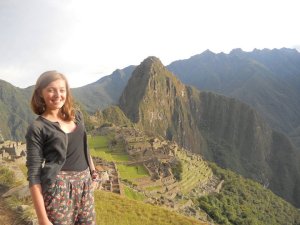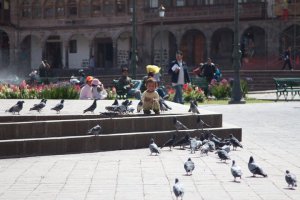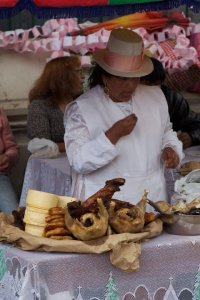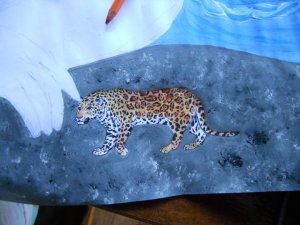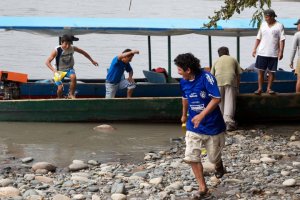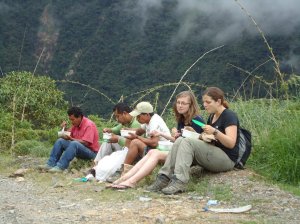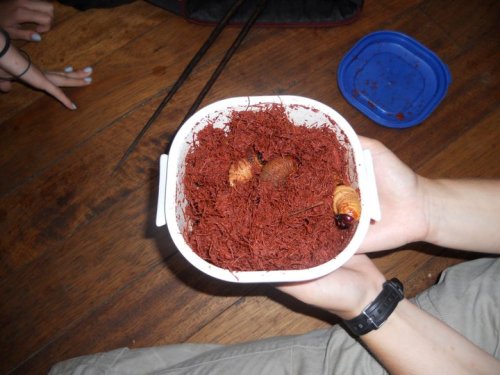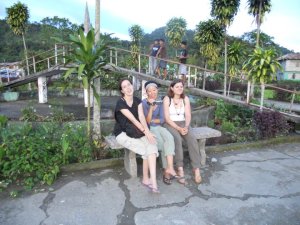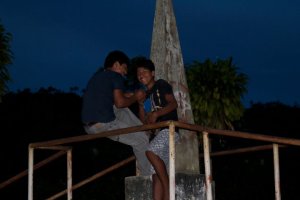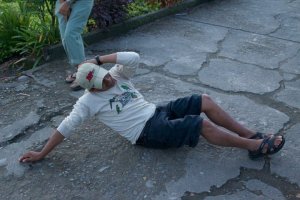
Much to Chico the monkey’s dismay, the chicas locas were off again after a night’s stay at Atalaya Lodge. I tried to offer him apples as a parting gift (i.e. left-over apples Carla had forced upon us when we left the MLC), but he took a bite from one, threw it on the ground, and gave me a look of disgust. I sighed and one of the “pirates” came up to us and pulled out a banana from behind his back. Chico lunged at him and consumed the fruit within moments. “Yeah, this monkey is spoiled,” I thought to myself. “A year with humans and he’s already picky about his fruit.”
I took the apples to Gabriela in the kitchen who gratefully accepted them. I tried to warn her that Chico had already done a number on one of them, but she didn’t seem concerned and placed them all in the icebox. “No problem. Muchas gracias, Tina. Visit again?”
We said our goodbyes and another pirate helped us across the river with the cable. And then we began our journey to Queros, the village of the Wachiperi community.
After a twenty-minute drive and a two hour walk in the heat down a dirt road, we arrived at Queros in record time. It was… empty. With the exception of Eddie, our guide, and his friend, no one else was around. A bare lawn between a set of houses made me think of an abandoned school playground over summer vacation. That is if the school playground had been overrun by chickens. I laughed to think that I was just reflecting on how nice it was to be back in civilization again, and there we were in a village where the foul were more plentiful than inhabitants.
 Twilight Zone Amazon style
Twilight Zone Amazon style
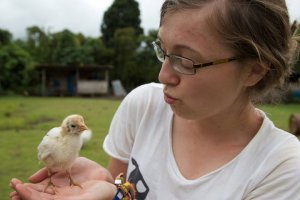 Sarah with one of the many chickens in Queros.
Sarah with one of the many chickens in Queros.
Eddie and Dioni took us to a wooden cabin at the entrance of the village. After my experience with Reynaldo, I was expecting squat toilets and cockroach-friendly accommodations, so I was pleasantly surprised to find that we had a REAL toilet, REAL beds, REAL walls, and wait for it… electricity. Really. Mind you, they only ran the generator for two hours at night, but hey, after a month of living in complete darkness at night, a couple of hours of synthetic light felt like an extravagant luxury. In fact, I was a little suspicious of it. It was blindingly bright, just glowing away when it wasn’t even necessary. So in your face. So flashy. Still, I was glad to finally charge my camera which had died out halfway through our Atalaya experience.
After our long walk, all of the girls including myself were too exhausted to move. I felt obligated to go talk to Eddie and find out more about his community, but I couldn’t help it, I was so tired, so I collapsed on my bed with the rest of the chicas locas in our room. By that point, all of the volunteers had gotten bitten on nearly every inch of flesh, so we passed around the cortisone cream like it was a peace pipe, taking relief in its soothing chill.
We laid there for nearly two hours, barely moving an inch. Some slept, but personally, I was just staring blankly at the top bunk, feeling my brain curdle from tiredness and heat.
“Chicas locas,” we heard from the dining room. Dioni, who had survived ten days in the forest eating nothing but leaves, probably thought we were the biggest sissies of all time. “It is time to get up. We are going to make jewelry and baskets with the women now, okay?” We quietly groaned and dragged ourselves out of bed.
Outside, the women had already gotten started. They threaded beads onto strings and wove baskets out of thin, bendable leaves. An elderly man was polishing a smooth arrow with macaw feathers protruding out the end.
“Girls, the woman pokes holes in these seeds and puts them on the string,” Dioni told us. “You can try now.” We began to make our own necklaces and bracelets while Dioni and the woman told us the different seed names: sera sera, walking palms, and huayruro seeds- the luckiest, most sacred seeds of the Amazon. The red of the seed symbolizes the earth, and the black represents all life. Drape yourself in these seeds, and you will be protected against evil and attract abundance. Once I had finished, I tied my necklace around my neck, but even the huayruro seeds couldn’t prevent was soon to come.
Dioni asked us if we wanted to escape the heat by going to the river. Erica and Hanako wanted to relax in the room, so Sarah and I joined him. Sarah just wanted to take pictures, so she sat on the bank as Dioni and I tried to find a safe place to swim. The water was frigid. The current tugged at my legs. “Are you sure about this?” I asked Dioni who was already several yards ahead, diving into the cold waters and laughing. “No problem! Come, Tina,” he called out to me. I followed him but kept my feet on the ground.
I looked back at Sarah who was barely visible close to the horizon. I turned back, shivering, took a breath, and dove in. Ice. I imagined the blood in my veins congealing. As cold as it was, the current was not as intense as it looked. “You see!” Dioni laughed. “No problem!” I laughed too and started doing the backstroke against the rushing water. No problem.
After a few minutes, Dioni swam to another bend in the river. He turned toward me and motioned for me to follow. I decided to walk there again. I didn’t want to take any chances with this river.
Once I got close, I felt the current turn colder and stronger. My foot met a large rock jutting out from the bottom of the riverbed, and I tried to readjust my footing, but it was too late. That one misstep sent me backwards, and before I knew it, I was being dragged along the river on my back, unable to stop myself. It was just for a few seconds close to the bank of the river, and I laughed, not taking what was happening seriously, but looking back, I remember how strong the pull of the water was- a siren impossible to resist.
“Give me your hand!” Dioni called out over the roaring water, and I reached out to him. He grabbed ahold of me and pulled me out. He laughed. A fish out of water. “Dioni, you quite possibly just saved my life,” I said somewhere in between sincerity and jest. What had just happened? Was that real or had I imagined it?
The sun was going down. We found Sarah where we had left her, beginning to look very bored. “I saw you out there, but then you disappeared for a bit,” she said. “Well, yeah,” I squirmed. “I kind of, possibly, almost drowned out there, so that’s probably why you didn’t see me.”
When we returned back to the community center, it was time for dinner. Now this is my speed, I thought. Food. Delicious and filling food. Nothing to fear.
The main component of the meal was yucca- the most common food in the Amazon, and sadly, the most boring food in the world. It has the carbyness of potatoes without any of their buttery goodness, and it leaves your mouth dry and your body constipated. The other dish we had was palmito. It’s the inside of a palm tree, and tastes surprisingly like buttered corn. I. Loved. It.
“Señora, this is the most delicious food I’ve had this whole month!” I beamed at the cook. She smiled and offered me more. I ate seconds. I ate thirds. I had three glasses of banana juice and some water from the tank that was deemed safe by our guide. Now I was content. All the heat exhaustion was gone and my bites were even itching less, and a vague sleepiness settled in my bones.
“Chicas,” Dioni addressed us. “Now we are going to a bonfire with some of the Wachiperi. They will show some typical dances and typical songs and tell some typical stories for us, okay?” Okay. We were sleepy, but we could swing this. How often do you get to experience the culture of an Amazonian community, anyway?
We got to the fire and were joined by Eddie, his friend, and the older gentleman who had been polishing the arrow earlier who was now dressed in traditional clothes made from squished plant fibers. He was proudly holding his arrow polished with a special blend of honey and minerals.
 In traditional Wachiperi clothing about to dance.
In traditional Wachiperi clothing about to dance.
Eddie lit the fire in the traditional way, by rubbing two pieces of wood together, representing the meeting of the male and female. Then he offered us a drink called chuchuwasa. “It’s very good. Strong,” he said. I took a sip. It was strong alright.
The older man told Dioni in Spanish with a Wachiperi lilt that he should translate his stories for us. In the first, there was a man named Ananewa who was the strongest of the Wachiperi. He would fight with jaguars and win. After the man died, the people of the village began to name their sons Ananewa out of respect. Until. All of the jaguars began to come after these boys and kill them. You see, the name had become a challenge to the jaguars. This is the reason why the Wachiperi never name their sons Ananewa. To do so would be to guarantee their untimely death. And apparently, there hasn’t been a strong man in Queros ever since.
The next one had something to do with a fox and a fire. Firefox? I tried to concentrate, but couldn’t manage it. All I know is that the stories came fast and furiously, with lots of repetition and lots of reprimands. “No, you’re not translating right, I know,” the man would say to Dioni. “Uy, no, no, no.” The stories went on and on. We were too tired to focus on discerning the man’s Wachiperi tinged Spanish or Dioni’s English, so we all sat there, smiling and nodding, not understanding a word.
When it was time to leave, we thanked the men and dragged ourselves to bed. I was so happy to finally sleep. Such a long day. Such a long, long day. Something stirred in my belly. I turned on my side. My stomach growled. I turned to my other side. Nope. I wasn’t going to let a little stomach ache stop me from sleeping. As I was drifting off, my stomach spasmed like an alien was trying to break through. “Oh, no,” I whispered as I instinctively jumped out of bed and ran to the outhouse.
A frog was perched on the toilet seat, staring at me with huge, buggy eyes. “Oh no. Oooooh no,” I said, opening the door to give him a path of escape. Any other time, I would have flipped out and ran to grab my camera, but not. right. now. I turned back to the toilet. He sat there watching me. “This is my toilet!” I said, shooing him away, my stomach seizing. He didn’t move. I took my shoe and poked him. He hopped off and disappeared. “Where did you go?” I said, checking inside the commode just in case. My stomach seized again. “I don’t have time for this,” I told the phantom frog and slammed the door.
Eight hours and many trips to the bathroom later, I determined that I must have food poisoning. I cursed the palmito that I had loved so dearly just hours before. But then I remembered the water I drank. It had something floating in it. Something white. I ran to the bathroom again for good measure.
As the sun came up and I stared wide-eyed at the top bunk, I hoped that what happened in Queros would stay in Queros.





